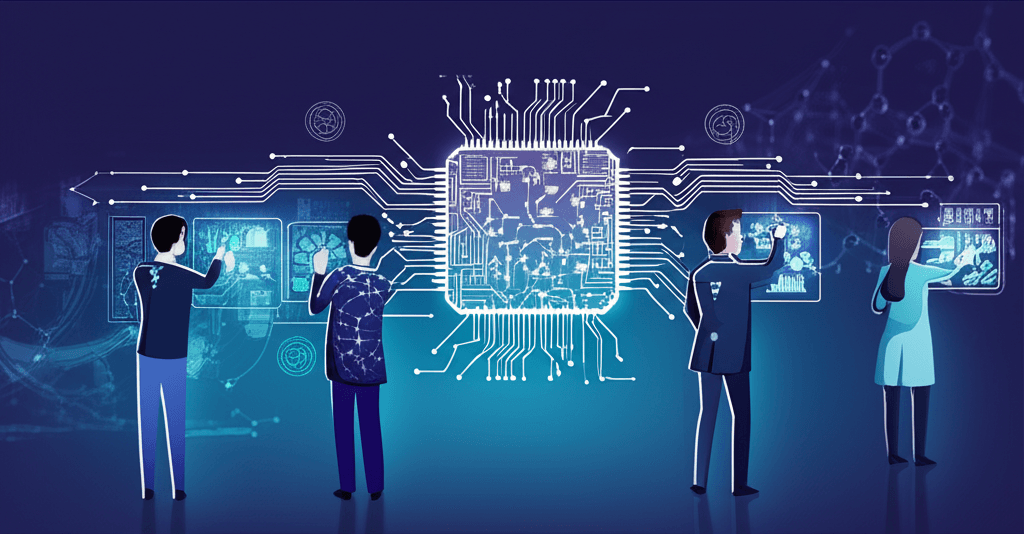AI Industry Demands Experts, Ditching Clickworkers for Quality Data
From crowdsourced clickworkers to specialized domain experts: AI's pursuit of superior data quality and model reliability.
July 21, 2025

A fundamental shift is underway in the world of artificial intelligence, as the industry pivots from a reliance on mass-market clickworkers to a new, highly-specialized workforce. Companies at the forefront of AI development are now actively recruiting experts in fields like physics, biology, software engineering, and finance to perform the nuanced task of data annotation. This move signals a maturing of the AI industry, where the quality and depth of training data are becoming paramount for creating more sophisticated and reliable models. Data annotation and labeling, the process of categorizing data to make it understandable for machine learning, has long been the backbone of AI development.[1][2][3] For years, this work was largely outsourced to crowdsourcing platforms and gig workers, who performed simple tasks like identifying objects in images.[4] However, as AI models grow in complexity and are applied to specialized, mission-critical domains, the need for data labeled with expert-level understanding has become undeniable.[5][6]
The primary driver behind this transition is the pursuit of higher quality and accuracy in AI models.[6] As AI systems move beyond basic tasks like differentiating cats from dogs, they require training on data that is not only accurately labeled but also contextually understood.[7][6] In fields like medical diagnostics, financial fraud detection, and autonomous vehicle operation, the cost of an error resulting from poorly labeled data can be immense.[8][3] Domain experts bring a layer of nuanced understanding, industry-specific knowledge, and an ability to recognize subtleties that a generalist workforce cannot provide.[9][7] This is particularly crucial for generative AI, where models must generate new, accurate, and contextually relevant content.[1] Companies like OpenAI, Google, and Anthropic are increasingly turning to specialists to fine-tune their models, recognizing that expert insight is essential for improving performance and ensuring the systems are helpful, truthful, and reliable.[10][5] This human-in-the-loop approach, where experts guide and verify AI-generated outputs, is becoming a standard for developing advanced AI.[11][7]
Leading data annotation companies are responding to this demand by building networks of highly skilled professionals. Firms such as Scale AI, Toloka, and Turing AI are now platforms where AI developers can connect with experts across a wide range of fields.[12][13][14] Scale AI, for instance, offers services that combine human annotators with AI tools to ensure precision and reliability in data labeling for text, images, audio, and 3D sensor data.[15][16] Toloka provides access to a global crowd of annotators, AI tutors, and subject matter experts in specialized areas, with a significant portion holding master's degrees or doctorates.[13][17] Similarly, Turing AI connects AI labs with expert coders and mathematicians to evaluate complex AI outputs, aiming to improve model capabilities in areas like code understanding and iterative debugging.[18][10][14] These platforms facilitate a more direct collaboration between AI developers and the domain experts whose knowledge is being used to train the next generation of AI.
This evolution in AI training carries significant implications for multiple sectors. For the AI industry itself, the move signifies a greater investment in data quality, which is expected to lead to more capable and trustworthy AI systems.[19] However, it also introduces new challenges. Recruiting and retaining experts is more expensive and complex than using a gig workforce, which can increase the cost of AI development.[12][20] Quality control processes must also be revamped, as tasks become more subjective and consensus among experts can be difficult to achieve.[12] For the traditional clickworker economy, this shift could mean a reduction in demand for low-skill data labeling tasks.[4] However, it also presents an opportunity for workers to specialize and upskill, moving into more stable and better-compensated roles.[21][4] For the experts themselves—the physicists, biologists, engineers, and financial analysts—this trend opens up a new avenue for applying their knowledge, allowing them to play an active role in shaping the future of AI in their respective fields.[9]
In conclusion, the transition from clickworkers to domain experts for AI training marks a critical maturation point for the artificial intelligence industry. Driven by the need for greater accuracy, nuance, and safety in advanced AI models, companies are increasingly investing in high-quality, expertly annotated data. This shift is reshaping the data annotation landscape, creating a new ecosystem of specialized talent and platforms designed to connect experts with AI developers. While this evolution brings economic and logistical challenges, it ultimately promises to accelerate the development of more sophisticated, reliable, and vertically-integrated AI applications across a multitude of industries. The future of AI will not be built on raw data alone, but on the deep, contextual understanding that only human expertise can provide.[22][23]
Sources
[1]
[2]
[3]
[6]
[7]
[9]
[10]
[13]
[14]
[15]
[17]
[18]
[19]
[21]
[22]
[23]